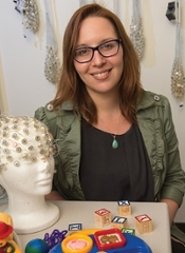
Researchers in the Center for Autism Research in Electrophysiology (CARE) Lab in the College of Arts and Sciences have made some important findings in looking at how children with autism process what they see.
The results reveal more evidence of heightened perception among children with autism, which could help explain some symptoms of autism. The findings were published in the Journal of Autism and Developmental Disorders.
“These results suggest that some of the perceptual strengths that are unique to individuals with autism are present both when looking at information over space, as well as over time,” says Assistant Professor Natalie Russo, director of the CARE Lab. “Many theories of autism suggest that temporal processing is atypical, or worse than among typically developing individuals. Our findings put some of this into question, but more research is needed to confirm or refute this.”
Russo, who is the principal investigator, conducts behavioral and psychophysiological research to understand how typically developing children, children with developmental disabilities and children on the autism spectrum process and integrate sensory information.
Read the full article at SU News.
